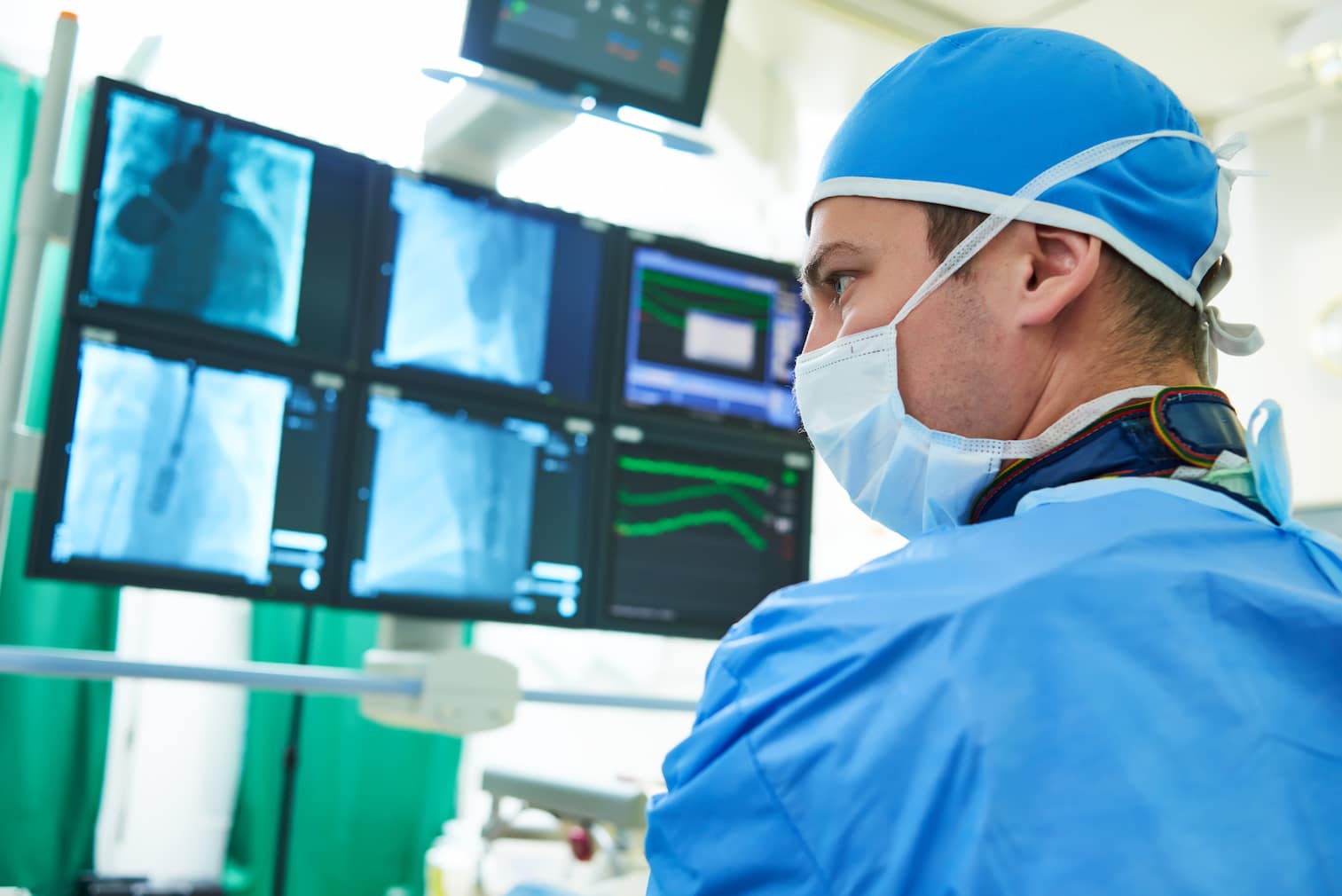Cardiology Treatment in Turkey
Healthy Türkiye helps you find the best cardiology treatment in Turkey at affordable prices and adopts a 360-degree service approach in all areas of health through affiliated hospitals.
- Medical Treatment
- Cardiology Treatment in Turkey
- Carotid Artery Stenting in Turkey
- Cerebrovascular Disease Treatment in Turkey
- Colour-Duplex Sonography in Turkey
- Pericarditis Treatment in Turkey
- Peripheral Artery Disease Treatment in Turkey
- Coronary Heart Disease Treatment in Turkey
- EECP Treatment in Turkey
- Congenital Heart Treatment in Turkey
- Electrophysiology Study in Turkey
- Nuclear Cardiology Test in Turkey
- Pediatric Cardiology Treatment in Turkey
- Rheumatic Heart Disease Treatment in Turkey
- Spiro-Ergometry in Turkey
- Homepage
- Medical Treatment
- Cardiology Treatment in Turkey

About Cardiology Treatment in Turkey
The purpose of cardiology treatment in Turkey is to study and cure medical conditions of the heart and blood vessels. A branch of medicine that specializes in diagnosing and treating heart diseases, blood vessels, and the circulatory system. These diseases include coronary artery disease, heart rhythm issues, and heart failure.
The term cardiology is derived from the Greek words “cardia,” which means “means to the heart and “logy” meaning “study of.” Cardiology is a branch of medicine that deals with diseases and disorders of the heart, which may range from congenital breakdowns to acquired heart diseases such as coronary artery disease and congestive heart failure. At Healthy Türkiye, we help you with everything from the beginning to the end of your medical travel.
In Turkey, specialists in cardiology are called cardiologists. Some of the strategies applied by cardiologists to fight cardiovascular illness include coronary artery bypass surgery, percutaneous coronary intervention, percutaneous transluminal angioplasty, and stenting. Cardiologists also can diagnose cardiovascular disorders using blood tests, cardiac stress tests, and echocardiography. Healthy Türkiye ensure you to meet the best Cardiologist in Turkey.

Cardiology Treatment Procedure in Turkey
Cardiology treatment in Turkey is a branch of general medicine. A cardiologist is not identic as a cardiac surgeon. A cardiac surgeon performs heart surgery by opening the chest. A cardiologist specializes in diagnosing and treating illnesses of the cardiovascular system. The cardiologist will implement tests, and they may perform some procedures, such as heart catheterizations, angioplasty, or insertion of a pacemaker. Heart disease depends specifically on the heart, while cardiovascular disease affects the heart, the blood vessels, or both. Healthy Türkiye help you to find the best cardiological treatment in Turkey.
Diagnostic tests are applied to confirm or rule out conditions and diseases. Before creating a treatment plan, your doctor needs information for a correct diagnosis, which a diagnostic test can provide. Your healthcare greeter will examine you and ask about your personal and family medical history. To qualify for common heart conditions you’ll need to have some tests. Healthy Türkiye provides you to benefit the best medical tests in Turkey.

We Care About Your Health
Healthy Türkiye provides the best for your health and comfort. You will feel privileged with us.
7/24 Quality Personal Assistance Throughout Your Journey
Customizable for You All-Inclusive Packages
Get the Right Advice for your Health
Types of Cardiology Treatment in Turkey
A long and healthy life begins with a healthy heart. The heart can malfunction for a variety of reasons, and occasionally the symptoms are not always visible. A physician with expertise in identifying issues with the heart and blood vessels nearby is known as a cardiologist. The types are interventional, non-invasive, and invasive cardiology in Turkey. Healthy Türkiye is an assistance specialist providing global health services including cardiology. Our clinics represent knowledge, safety, and competence all over the world.
Invasive Cardiology Treatment in Turkey
Invasive cardiology applies open or minimally-invasive surgery to define or treat structural or electrical abnormalities within the heart’s structure. Common types of invasive cardiology:
Angioplasty: When plaque clogs your arteries, it becomes tough for blood to flow normally. Angioplasty inserts a tiny balloon into your clogged vein and pushes the plaque against the walls, permitting increased blood flow.
Stenting: Stenting is usually used in conjunction with angioplasty. A cardiac stent is a small metal coil that permanently keeps a clogged vein open.
Non-Invasive Cardiology Treatment in Turkey
Non-invasive cardiology defines heart problems without using any needles, fluids, or other instruments that are inserted into the body. Non-invasive cardiologists utilize techniques such as:
Nuclear cardiology: A non-invasive study of cardiovascular diseases by means of various types of imaging which may use radioactive elements.
Echocardiography: The use of ultrasound waves to show images of the heart and surrounding structures to identify how well the heart pumps blood, infections, and structural abnormalities.
Cardiac electrophysiology: Study and testing of the electrical currents that form heartbeats.
Stress test: Stress testing generally involves exercise, which is monitored by your cardiologist. These exercises ensure your cardiologist has information about how your heart performs under physical stress.
Heart monitors: Heart monitors may also be known as Holter monitors or cardiac event recorders. Heart monitors are essentially tape recorders for your heart’s electrical activity over a set amount of time.
CT scans: CT scans generate images that your cardiologist can examine for heart disease and atherosclerosis.
Once your specialist has identified risk factors or existing conditions, they may recommend medication and lifestyle changes.
Interventional Cardiology Treatment in Turkey
Interventional cardiology in Turkey is a non-surgical option that uses a small, flexible tube to repair damaged or weakened vessels, narrowed arteries, or other affected parts of the heart condition. Common conditions treated by interventional cardiology:
Coronary artery disease: A narrowing of the arteries that supply the heart muscle with blood and oxygen.
Heart valve disease: Occurs when the valves which control blood flow into the heart’s chambers are not avails correctly.
Peripheral vascular disease: Your heart can also be affected by clogged or hardened veins and arteries in other parts of your body.
Types of the Medical Tests in Cardiology Treatment in Turkey
Medical tests in Turkey are the first step in the treatment of possible cardiological diseases. Medications may be required to control heart disease symptoms and inhibit complications. The type of medication used depends on the type of heart disease. Healthy Türkiye ensures you the most qualified treatment.
Electrocardiogram (ECG or EKG): An ECG is a quick and pain-free test that records the electrical signals in the heart. It can show if the heart is beating too fast or too slowly.
Holter monitoring: A Holter monitor is a mobile ECG device that’s worn for a day or more to record the heart’s activity during daily activities. This test can detect irregular heartbeats that aren’t unforseen during a regular ECG exam.
Echocardiogram: This noninvasive exam uses sound waves to generate detailed images of the heart in motion. It shows how blood moves through the heart and heart valves. An echocardiogram can help determine if a valve is narrowed or leaking.
Exercise tests or stress tests: These tests comprise walking on a treadmill or riding a stationary bike while the heart is monitored. Exercise tests show how the heart responds to physical activity and whether heart disease symptoms occur during exercise.
Cardiac catheterization: This test shows blockages in the heart’s arteries. A long, thin, flexible tube (catheter) is inserted in a blood vessel, generally in the groin or wrist. Dye flows through the catheter to arteries in the heart. The dye helps the arteries show up more clearly on the X-ray images taken during the test.
Cardiovascular Disease: There are several types of heart disease treated in Turkey, and each one has its own symptoms and treatment. For some, lifestyle changes and medicine can make a huge difference in enhancing your health. For others, you may need surgery to make your ticker work well again. Healthy Türkiye helps you for all stages of your health issues.
Find out about some of the common types of heart disease and how to avoid them as well as how they’re treated.

Types of Cardiovascular Diseases in Turkey
There are several types of heart disease in Turkey, and each one has its own symptoms and treatment. For some, lifestyle changes and medicine can make a big difference in enhancing your health. For others, you may need surgery to make your ticker work well again. Healthy Türkiye consultants provides all information about cardiology procedures.
Coronary Artery Disease (CAD): CAD is the most common heart disease. With CAD, you may get blockages in your coronary arteries which are the vessels that supply blood to the heart. That can cause a decrease in the flow of blood to your heart muscle, keeping it from getting the oxygen it needs. The disease generally starts as a result of atherosclerosis, a condition sometimes called the hardening of the arteries.
Heart Arrhythmias: A heart arrhythmia is an irregular heartbeat. Heart arrhythmias occur when the electrical signals that coordinate the heart’s beats don’t work appropriately. The faulty signaling tends the heart to beat too fast (tachycardia), too slow (bradycardia), or irregularly.
Heart Failure: Heart failure means that the heart is unable to pump blood around the body properly. It usually occurs, because the heart has become too weak or stiff. It’s called congestive heart failure, although this name is not used now. Heart failure does not mean your heart has stopped working. It means it needs support to help it work better.
Heart Valve Disease: In heart valve disease, one or more of the valves in your heart don’t work warrantably. Your heart has four valves that flow blood in the correct direction. In some instances, one or more of the valves don’t open or close properly. This can cause the blood flow through your heart to your body to become disorganized.
Cardiomyopathy (Heart Muscle Disease): Cardiomyopathy is a term for diseases of the heart muscle, where the walls of the heart chambers have become stretched, thickened, or stiff. This affects the heart’s ability to pump blood around the body.

Cardiology Treatments in Turkey
Cardiology treatments in Turkey depend on your cardiovascular disease. A coronary angioplasty is also known as percutaneous coronary intervention (PCI). The purpose of this procedure is to open narrowings in arteries that can cause chest pain or heart attacks. This permits the blood to flow more freely and supplies the heart muscle with enough oxygen. Usually, it is combined with the insertion of a stent, which is a small stainless steel mesh tube that holds the artery open and prevents re-narrowing from occurring. Coronary angioplasty is used to treat atherosclerosis (when the arteries become narrowed and hardened), which can cause angina and heart attacks. Healthy Türkiye provides you to meet the best cardiologist in order to diagnose your heart disease.
Coronary Angiography: Coronary angiography, or arteriography, is an investigation that ensures detailed images of the coronary arteries. X-ray pictures of the heart are taken while a special contrast agent is injected into the heart, generally from the wrist, to produce a series of images of the coronary arteries called angiograms. Coronary angiography is used to investigate a variety of heart conditions.
Pacemaker Implantation: A pacemaker is a small electrical appliance that sends electrical pulses to your heart to keep it beating regularly and not too slowly. Pacemaker implantation is one of the most common types of heart surgery carried out in Turkey. It’s a relatively explicit procedure that’s usually performed under local anesthesia and should take about an hour. Once implanted, a pacemaker can improve the quality of your life if you have problems with a slow heart rate.
Loop Recorder Implantation: A loop recorder is a small cardiac recording appliance that is placed under the skin on the chest to continuously monitor your heart rate and rhythm. It’s inserted under the skin below the collarbone. Patients are given a small hand-held activator to carry around that will trigger the appliance to store information when they experience symptoms such as palpitations or fainting. All recordings of the heart’s rhythm can be downloaded by the cardiology department.
Echocardiography: Echocardiography is one of the most commonly used diagnostic tests for heart disease and valve issues. It uses ultrasound to produce a moving, real-time image of your heart. These images allow your clinician to check your heart’s structure and see how well it’s functioning. It can monitor the size and shape of your heart, if a wall or section of the heart muscle is weak and not working correctly if you’ve got issues with your heart’s valves, or, if you’ve got a blood clot.
Cardiac Resynchronization Therapy: Cardiac resynchronization therapy (CRT) is applied to improve your heart’s rhythm and muscle coordination between the left and right ventricles so that they contract simultaneously and develop the overall function of your heart. It’s used in patients with poor ventricular function, for example, patients with heart failure or patients with arrhythmia (irregular heart rhythms). The small CRT device is usually implanted with a local anesthetic under your collarbone.
Implantable Cardioverter Defibrillator Implantation: An implantable cardioverter-defibrillator (ICD) is a small appliance that is placed in your chest to reduce your risk of sudden death if the lower chambers of your heart assume a dangerous rhythm and stop beating effectively, known as cardiac arrest.
What Health Conditions Increase the Risk of Heart Disease?
High blood pressure is the main risk factor for heart disease. It is a medical condition that occurs when the pressure of the blood in your arteries and other blood vessels is too high. If it is not controlled, high blood pressure can affect your heart and other major organs of your body, including your kidneys and brain.
Cholesterol is a waxy, fat-like substance made by the liver or found in foods. Your heart makes enough for your body’s needs, but we often get more cholesterol from the foods consumed.
Diabetes mellitus Your body requires glucose (sugar) for energy. Insulin is a hormone made in the pancreas that helps move glucose from the food you eat to your body’s cells for energy. If you have diabetes, your body doesn’t create enough insulin, can’t use its own insulin as well as it should, or both.
Obesity is a disease caused by excess body fat. Obesity is linked to higher cholesterol and triglyceride levels and to lower cholesterol levels. Obesity can cause high blood pressure and diabetes as well as heart disease.
What Behaviors Increase the Risk of Heart Disease?
Eating a diet high in saturated fats, trans fats, and cholesterol has been linked to heart disease and related conditions, such as atherosclerosis. Not getting enough physical activity can cause heart disease. It can also increase the risk of having other medical conditions that are risk factors, including obesity, high blood pressure, high cholesterol, and diabetes.
Tobacco use increases the risk of heart disease and heart attack. Smoking can damage the heart and blood vessels, which increases your risk for heart problems such as atherosclerosis and heart attack. Nicotine negatively affects blood pressure.
2025 Cost of Cardiology Treatments in Turkey
All types of medical attention, like cardiologic treatments, are very affordable in Turkey. Many factors are also included in determining the cost of cardiologic treatments in Turkey. Your process with Healthy Türkiye will last from the time you decide to have cardiologic treatments in Turkey until the time you are fully recovered, even if you are back home. The exact cost of a cardiologic procedure in Turkey depends on the type of operation involved.
The cost of cardiologic treatments in Turkey does not demonstrate many variations in 2025. Compared to costs in developed countries like the United States or the UK, cardiologic treatment costs in Turkey are relatively low. So, it’s no wonder patients from across the world visit Turkey for cardiologic treatments and procedures. However, price is not the only factor affecting choices. We suggest looking for hospitals that are safe and have reviews of cardiologic treatments on Google. When people decide to seek medical help for cardiologic treatments, they will not only have had low-cost procedures in Turkey, but also the safest and best treatment.
At clinics or hospitals contracted with Healthy Türkiye, patients will receive the best cardiologic treatments from specialist doctors in Turkey at affordable rates. Healthy Türkiye teams provide medical attention, cardiologic treatment procedures, and high-quality treatment to patients at a minimum cost. When you contact Healthy Türkiye assistants, you can get free information about the cost of cardiologic treatments in Turkey and what this cost covers.
The cost of cardiology treatment in the UK is between £5,000 to £80,000.
The cost of cardiology treatment in the USA is between $10,000 to $100,000.
The cost of cardiology treatment in Turkey is between $2,000 to $50,000.
Price of cardiology treatment in the UK?
Price of cardiology treatment in the USA?
Price of cardiology treatment in Turkey?
Why Is Cardiology Treatment Cheaper in Turkey?
One of the main considerations before traveling abroad for cardiology is the cost-effectiveness of the whole process. Many patients think that when they add flight tickets and hotel expenses to their cardiology costs, it will become very expensive to travel, which is not true. Contrary to popular belief, round-trip flight tickets to Turkey for cardiology can be booked very affordably. In this case, assuming you are staying in Turkey for your cardiology, your total travel expense of flight tickets and accommodation will only cost less than any other developed country, which is nothing compared to the amount that you are saving.
The question “Why is cardiology cheaper in Turkey?” is so common between patients or people simply curious about getting their medical treatment in Turkey. When it comes to cardiology prices in Turkey, there are 3 factors allowing for cheaper prices:
The currency exchange is favorable for whoever looking for cardiology has a euro, dollar, or pound;
The lower cost of living and more affordable overall medical expenses such as cardiology;
For cardiology, incentives are given by the Turkish Government to medical clinics working with international clients;
All these factors allow for cheaper cardiology prices, but let’s be clear, these prices are cheaper for people with strong currencies (as we said, euro, dollar, Canadian dollar, pound, etc).
Every year, thousands of patients from all over the world come to Turkey to get cardiology. The success of the healthcare system has increased in recent years, especially in cardiology. It’s easy to find well-educated and English-speaking medical professionals in Turkey for all kinds of medical treatment such as cardiology.
Why Choose Turkey for Cardiology Treatment?
Turkey is a common choice among international patients seeking advanced cardiology. Turkey’s health procedures are safe and effective operations with a high success rate like cardiology. The increasing demand for high-quality cardiology at affordable prices has made Turkey a popular medical travel destination. In Turkey, cardiology is performed by highly experienced and trained doctors with the most advanced technology in the world. cardiology is done in Istanbul, Ankara, Antalya, and other major cities. The reasons for choosing cardiology in Turkey are as follows:
High-quality hospitals: Joint Commission International (JCI) accredited hospitals have dedicated cardiology units that are specially designed for patients. International and national strict protocols provide effective and successful cardiology for patients in Turkey.
Qualified experts: The expert teams include nurses and specialist doctors, together to carry out cardiology according to the patient’s needs. All the included doctors are highly experienced in performing cardiology.
Affordable price: The cost of cardiology in Turkey is affordable compared to Europe, the USA, the UK, Singapore, Australia, etc.
The high success rate: Highly experienced specialists, the best available technology, and stringently followed safety guidelines for post-operative care of the patient, resulting in a high success rate for cardiology in Turkey.
Is Cardiology Treatment Safe in Turkey?
Did you know Turkey is one of the most visited destinations for cardiology in the world? It is ranked as one of the most popular tourist destinations for cardiology. Over the years, it has also come to be a very popular medical tourism destination too with many tourists coming in for cardiology. There are so many reasons why Turkey stands out as a leading destination for cardiology. Because Turkey is both safe and easy to travel to, with a regional airport hub and flight connections to pretty much everywhere, it is preferred for cardiology.
The best hospitals in Turkey have experienced medical staff and specialists who have performed thousands of medical services such as cardiology. All procedures and coordination related to cardiology are controlled by the Ministry of Health in accordance with the law. Over many years, the greatest progress in medicine has been observed in the field of cardiology. Turkey is known among foreign patients for its great opportunities in the area of cardiology.
To emphasize, besides the price itself, the key factor in selecting a destination for cardiology is certainly the standard of medical services, the hospital staff’s high expertise, hospitality, and the safety of the country.
All-Inclusive Packages for Cardiology Treatment in Turkey
Healthy Türkiye offers all-inclusive packages for cardiology treatment in Turkey at much lower prices. Extremely professional and experienced doctors and technicians carry out high-quality cardiology treatment. The cost of cardiology treatment in European countries can be quite expensive, especially in the UK. Healthy Türkiye provides cheap all-inclusive packages for a long and short stay of cardiology treatment in Turkey. Because of many factors, we can provide you with many opportunities for your cardiology treatment in Turkey.
The price of cardiology treatment differs from other countries due to medical fees, staff labor prices, exchange rates, and market competition. You can save much more in cardiology treatment compared to other countries in Turkey. When you purchase a cardiology treatment all inclusive package with Healthy Türkiye, our healthcare team will present a list of hotels for you to choose from. In cardiology treatment travel, the price of your stay will be included in the all-inclusive package cost.
In Turkey, when you purchase cardiology treatment all-inclusive packages through Healthy Türkiye, you will always receive VIP transfers. These are provided by Healthy Türkiye, which is contracted with highly qualified hospitals for cardiology treatment in Turkey. Healthy Türkiye teams will organize everything about cardiology treatment for you and have you picked up from the airport and safely brought to your accommodation. Once settled in the hotel, you will be transferred to and from the clinic or hospital for cardiology treatment. After your cardiology treatment has been successfully completed, the transfer team will return you to the airport in time for your flight home. In Turkey, all packages of cardiology treatment can be arranged upon request, which relaxes the minds of our patients.
The Best Hospitals in Turkey for Cardiology Treatment
The best hospitals in Turkey for cardiology treatment are Healthy Türkiye, Memorial Hospital, Acıbadem International Hospital, and Medicalpark Hospital. These hospitals attract patients from all over the world seeking cardiology treatment due to their affordable prices and high success rates.
Best Doctors and Surgeons in Turkey for Cardiology Treatment
The best doctors and surgeons in Turkey for cardiology treatment are highly skilled professionals who offer specialized care and advanced procedures. With their expertise and state-of-the-art techniques, these specialists ensure that patients receive high-quality cardiology treatment and achieve optimal health results.

Frequently Asked Questions
Cardiologists diagnose, assess, and treat patients with defects and diseases of the heart and blood vessels, which together are known as the cardiovascular system.
A cardiologist is a physician who's an expert in the care of your heart and blood vessels. They can treat or help you prevent a number of cardiovascular problems. They can also be special in specific areas, such as abnormal heart rhythms, heart failure, or heart problems you've had since birth.
Cardiologists can diagnose heart problems, apply minimally invasive procedures, and ensure long-term treatment. Cardiac surgeons work on cardiologists' advice and provide treatment for complicated surgical procedures.
While cardiologists cannot perform surgeries, there are some specialized procedures that they can perform. An interventional cardiologist, for instance, can use stents to open clogged arteries. They can also put some advanced devices in the hearts of patients that have some heart disorders.
Examining your neck can reveal possible circulatory problems. Your healthcare specialist uses 2 fingers on each side of your neck to feel your carotid pulse. The right and left carotid arteries to assist the blood to the brain. Weak pulses could show a problem with the aortic valve or with the aorta.
Complete a physical examination. Your cardiology specialist might complete a medical examination. This involves checking your weight and testing for high blood pressure, high cholesterol, and other risk factors for heart disease.
There are three main types of cardiology: invasive, non-invasive, and interventional. Your cardiologist may use one or a combination of techniques to identify and treat your heart condition.
Blood tests, electrocardiogram (ECG), exercise stress tests, echocardiogram (ultrasound), nuclear cardiac stress tests, magnetic resonance imaging (MRI), and coronary computed tomography angiograms are used.
Electrocardiogram. An electrocardiogram (ECG) is a test that records the electrical activity of the heart. The ECG reflects what's happening in different sites of the heart and helps identify any issues.
However, even if you don't have a diagnosed heart disease, it's crucial to see a cardiologist at least once a year for prevention purposes.
